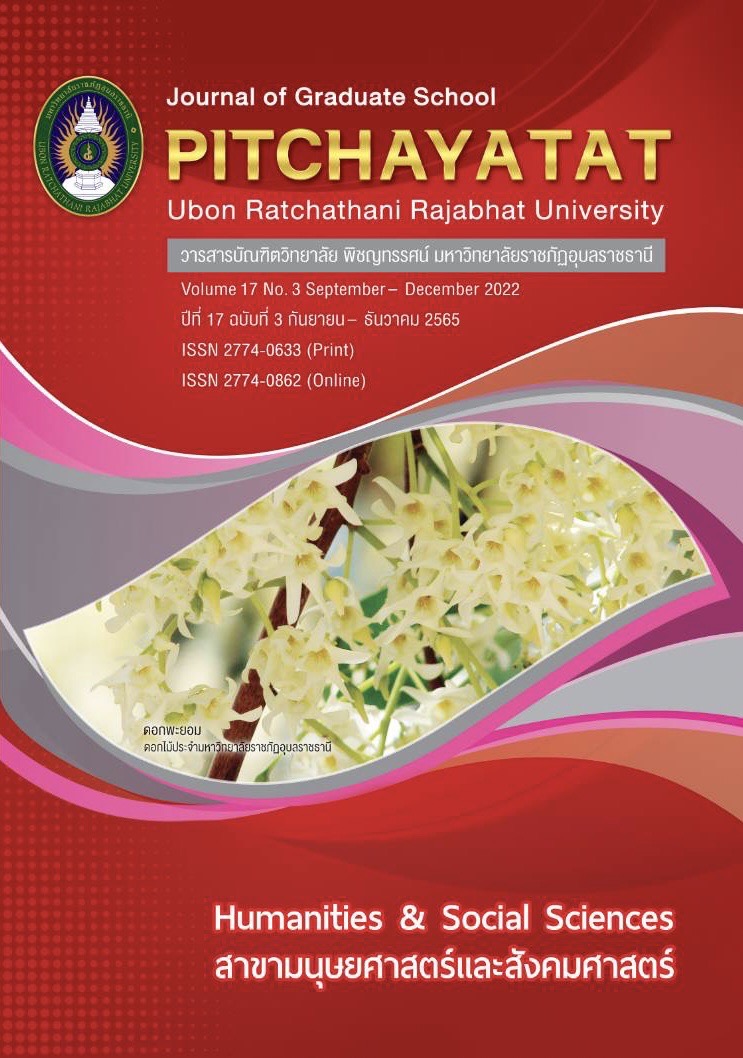การวิจัยเชิงปฏิบัติการแบบมีส่วนร่วมเพื่อการพัฒนาครูสู่ผู้เรียนในศตวรรษ ที่ 21
คำสำคัญ:
การวิจัยเชิงปฏิบัติการแบบมีส่วนร่วม , การพัฒนาครู , ผู้เรียนในศตวรรษ ที่ 21บทคัดย่อ
งานวิจัยนี้เป็นการวิจัยเชิงคุณภาพ มีวัตถุประสงค์เพื่อ 1) ศึกษาสภาพปัจจุบันและความต้องการพัฒนาตนเองของครูตามกรอบสมรรถนะผู้เรียนในศตวรรษที่ 21 2) ศึกษาสภาพการเปลี่ยนแปลงที่เกิดขึ้นในระดับบุคคล กลุ่มบุคคล และระดับโรงเรียน และ3) ศึกษาความพึงพอใจของผู้มีส่วนได้ส่วนเสียต่อการพัฒนาตนเองของครูสู่ผู้เรียน โดยใช้วิจัยเชิงปฏิบัติการแบบมีส่วนร่วม กลุ่มเป้าหมายได้แก่ 1) ผู้ร่วมวิจัย ประกอบด้วย ผู้บริหาร ครู และบุคลากร ที่สอนในโรงเรียนที่เป็นกรณีศึกษา จำนวน 15 คน 2) ผู้มีส่วนได้ส่วนเสีย ได้แก่ ผู้ร่วมวิจัย ผู้เรียน ผู้ปกครอง และคณะกรรมการสถานศึกษาทุกคน 3) ผู้ทรงคุณวุฒิจำนวน 12 คน ทำหน้าที่ในการวิพากษ์ผลการวิจัยและประเมินผลกระบวนการพัฒนาตนเองของครู เครื่องมือที่ใช้ในการวิจัยได้แก่ แบบสำรวจ แบบบันทึก แบบสังเกต แบบประเมินความพึงพอใจ แบบประเมินผลกระบวนการพัฒนา การวิเคราะห์ข้อมูลเชิงคุณภาพใช้การวิเคราะห์ เชิงเนื้อหา ส่วนสถิติที่ใช้ในการวิเคราะห์ข้อมูลเชิงปริมาณ ได้แก่ ค่าเฉลี่ย ร้อยละ และส่วนเบี่ยงเบนมาตรฐาน
ผลการวิจัยพบว่า
- สภาพปัจจุบันและความต้องการพัฒนาตนเองของครู ส่วนใหญ่เป็นการอบรมตามนโยบาย ตามโครงการจากหน่วยงานที่เกี่ยวข้องกำหนด ไม่ได้เกิดจากความต้องการที่แท้จริงของครู การสำรวจความต้องการพัฒนาตนเองของครู พบว่าครูมีความต้องการพัฒนาตนเองให้มีสมรรถนะด้านทักษะการคิดขั้นสูง ด้านการสื่อสารและเทคโนโลยีสารสนเทศ ด้านการเห็นคุณค่าและรักท้องถิ่น ด้านการเป็นพลเมืองดีเข้มแข็งมี ความสุข มีคุณธรรม และด้านการมีความร่วมมือร่วมใจ ทำงานเป็นทีมมีภาวะผู้นำ
- สภาพการเปลี่ยนแปลงที่เกิดขึ้นในระดับบุคคลได้แก่ครูมีการ 1) วางแผนที่มีเป้าหมายชัดเจน 2) เปิดใจ เปิดรับ พร้อมปรับเปลี่ยนพัฒนา 3) ออกแบบกิจกรรมที่เน้นผู้เรียนลงมือปฏิบัติ ผู้เรียนเป็นเจ้าของการเรียนรู้ 4) เปลี่ยนบทบาทเป็นผู้ช่วยเหลือ ดูแล แนะนำ สังเกต บันทึก และครูมีการ 5) แลกเปลี่ยนเรียนรู้ สะท้อนผลเชิงบวก การเปลี่ยนแปลงในระดับโรงเรียนเกิดวัฒนธรรมองค์กรการทำงานร่วมกันมีนวัตกรรมการศึกษาชั้นเรียนเพื่อพัฒนาตัวครูคู่ขนานกับพัฒนาสมรรถนะผู้เรียนและมีผลสัมฤทธิ์ระดับชาติปีการศึกษา 2563 สูงขึ้น
- ความพึงพอใจของผู้มีส่วนได้ส่วนเสียที่มีต่อการพัฒนาตนเองของครูสู่ผู้เรียน ในศตวรรษที่ 21 อยู่ในระดับมากที่สุด
เอกสารอ้างอิง
พิภพ เสวกวรรณ์. การพัฒนากลยุทธ์การบริหารแผนพัฒนาคุณภาพการศึกษาของสถานศึกษาขั้นพื้นฐาน สังกัดสำนักงานเขตพื้นที่การศึกษาประถมศึกษา กำแพงเพชร เขต 1 และเขต 2. วิทยานิพนธ์ครุศาสตร มหาบัณฑิต มหาวิทยาลัยราชภัฎกำแพงเพชร, 2556.
พรรณี ลีกิจวัฒนะ. วิธีวิจัยทางการศึกษา. กรุงเทพฯ: สถาบันเทคโนโลยีพระจอมเกล้าเจ้าคุณทหารลาดกระบัง, 2549.
มานพ สกลศิลป์ศิริ. การพัฒนาคุณภาพครู ในสถานศึกษาขั้นพื้นฐาน: การวิจัยเชิงปฏิบัติการแบบมีส่วนร่วม. วิทยานิพนธ์ศึกษาศาสตรดุษฎีบัณฑิต มหาวิทยาลัยขอนแก่น, 2553.
ไมตรี อินทรประสิทธิ์. กระบวนการแก้ปัญหาในคณิตศาสตร์ระดับโรงเรียน. ขอนแก่น: ศูนย์วิจัยคณิตศาสตร์ศึกษา, 2557.
เลขาธิการสภาการศึกษา, สำนักงาน. แผนการศึกษาแห่งชาติ พ.ศ. 2560-2579. กรุงเทพฯ: พริกหวานกราฟฟิค, 2560.
ศุภณัฏฐ์ ศศิวุฒิวัฒน์ และโชษิตา สลักคำ. การขยายผลโรงเรียนคุณภาพดีในประเทศไทย. กรุงเทพฯ: สถาบันวิจัยเพื่อการพัฒนาประเทศไทย, 2561.
James, E. A., M.t Milenkiewicz and A. Bucknam. Participatory action research for Educational Leadership: Using Data-Driven Decision Making to Improve Schools. California: Sage, 2008.
Khosravani, M. and A. Khorashadyzadeh. “Analyzing the Effects of Iranian EFL Textbooks on Developing Learners’ Life Skills,” English Language Teaching. 7, 6 (May 2014): 54- 67.
Kemmis, S. et al. The action research planner: Doing critical participatory action research. New York: Springer, 2014.
Martirosyan, N. M., D. P. Saxon, and R. Wanjohi. “Student Satisfaction and Academic Performance in Armenian Higher Education,” American International Journal of Contemporary Research. 4, 2 (February 2014): 1-5.
Sembiring, M. G. “Validating Student Satisfaction Related to Persistence, Academic Performance, Retention and Career Advancement within ODL Perspectives,” Open Praxis. 7, 4 (June 2015): 325–337.
ดาวน์โหลด
เผยแพร่แล้ว
รูปแบบการอ้างอิง
ฉบับ
ประเภทบทความ
สัญญาอนุญาต
ลิขสิทธิ์ (c) 2022 วารสารบัณฑิตวิทยาลัย พิชญทรรศน์ มหาวิทยาลัยราชภัฏอุบลราชธานี

อนุญาตภายใต้เงื่อนไข Creative Commons Attribution-NonCommercial-NoDerivatives 4.0 International License.
บทความทุกเรื่องได้รับการตรวจความถูกต้องทางวิชาการโดยผู้ทรงคุณวุฒิภายนอกอย่างน้อย 3 คน ความคิดเห็นในวารสารพิชญทรรศน์เป็นความคิดเห็นของผู้นิพนธ์มิใช่ความคิดเห็นของผู้จัดทำ จึงมิใช่ความรับผิดชอบของวารสารพิชญทรรศน์ และบทความในวารสารพิชญทรรศน์สงวนสิทธิ์ตามกฎหมายไทย การจะนำไปเผยแพร่ต้องได้รับอนุญาตเป็นลายลักษณ์อักษรจากกองบรรณาธิการ





